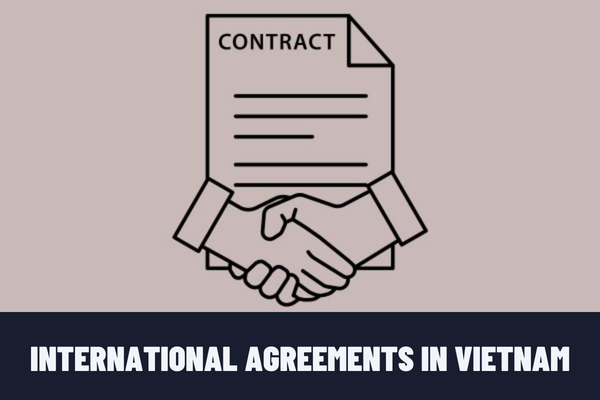What is an international agreement? What are the rules for conclusion and implementation of international agreements in Vietnam?
What is an international agreement?
According to the provisions of Article 2 of the 2020 Law on International Agreements in Vietnam, the definition of an international agreement and conclusion is as follows:
Interpretation of terms
For the purpose of this Law, these terms below shall be construed as follows:
1. “international agreement” means a written agreement on international cooperation between a Vietnamese contracting party, within its functions, tasks and powers, and a foreign contracting party, which does not give rise to, alter or terminate a right or obligation of the Socialist Republic of Vietnam under international law.
…
5. “conclusion" means a legal act performed by a competent person or authority, including signing, ratification of international agreement or exchange of instruments constituting an international agreement.
Thus, the conclusion of an international agreement is understood as a legal act performed by a competent person or authority, including signing, ratification of international agreement in writing on international cooperation between a Vietnamese contracting party and a foreign contracting party or exchange of instruments constituting an international agreement.

What is an international agreement? What are the rules for conclusion and implementation of international agreements in Vietnam?
What are the rules for conclusion and implementation of international agreements in Vietnam?
According to Article 3 of the 2020 Law on International Agreements in Vietnam on the rules for conclusion and implementation of international agreements as follows:
Firstly, compliance with the Constitution and laws of the Socialist Republic of Vietnam, national interests, foreign policy of the Socialist Republic of Vietnam and international treaties to which the Socialist Republic of Vietnam is a signatory; compliance with the principle of respect for national sovereignty, non-interference in the internal affairs of countries and other basic principles of international law.
Secondly, the conclusion of an international agreement may not give rise to, alter or terminate the rights and obligations of the Socialist Republic of Vietnam in accordance with international law; may not conclude an international agreement on matters that must be achieved through the conclusion of a treaty in accordance with law.
Thirdly, assurance of the external relations and effectiveness of the concluded international agreement, within the state budget allocated or autonomous budget according to the provisions of law.
Fourthly, in conformity with the functions, tasks and powers of the agencies or organizations concluding international agreements and with the procedures for concluding international agreements specified in this Law.
Fifthly, the conclusion of international agreements by agencies and organizations specified at Points b, c, d, dd, e, g, h, i and k, Clause 2, Article 2 of the 2020 Law on International Agreements in Vietnam shall not be binding on the State, the National Assembly, the Government or Vietnamese agencies or organizations that have not concluded these international agreements.
Sixthly, communal People's Committees in border areas only conclude international agreements with foreign contracting parties being equivalent local governments on information exchange, pairing, cooperation in border management in accordance with relevant international treaties to which the Socialist Republic of Vietnam is a signatory.
Seventhly, the Vietnamese contracting party is responsible for implementing the signed international agreement, and at the same time, has the right to request the foreign contracting party also implement such international agreement in a spirit of friendship and cooperation.
What are the requirements for application of reduced procedures for conclusion of international agreements?
According to the provisions of Article 35 of the 2020 Law on International Agreements in Vietnam, the conclusion of an international agreement according to the reduced procedures must satisfy the following requirements:
Requirements for application of reduced procedures for conclusion of international agreements
1. Reduced procedures for conclusion of international agreements in the name of the State, the National Assembly or the Government will apply if the following requirements are met:
a) The conclusion of international agreements is consistent with policies and projects that obtain approval from the State President, Prime Minister, President of the National Assembly or from competent authorities with the consent of the State President, Prime Minister or President of the National Assembly;
b) In urgent cases due to political and foreign affair requirements.
2. The reduced procedures apply to the conclusion of international agreements in the name of central regulatory bodies, provincial regulatory bodies and central agencies of organizations will apply if the following requirements are met:
a) Obtaining the permission of a competent authority to sign in the visit of a Vietnamese high-level delegation in a foreign country or a foreign high-level delegation in Vietnam;
b) In urgent cases due to political, foreign affairs, emergency relief, and disaster or epidemic recovery.
Thus, the conclusion of an international agreement according to the reduced procedures must satisfy the above requirements.
LawNet
